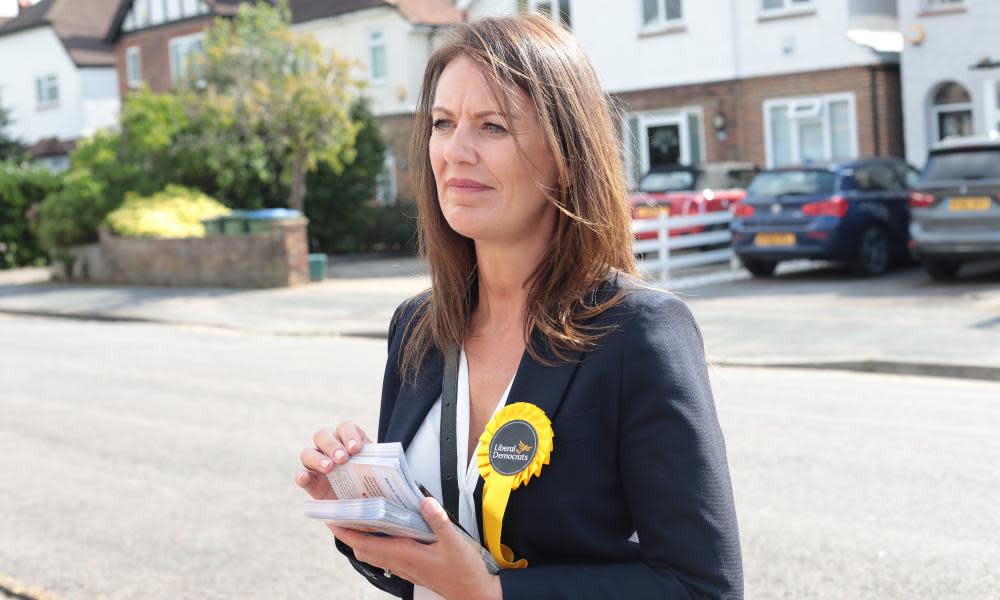Mood in Raab’s Surrey seat buoys Lib Dems on eve of party conference

Dominic Raab might feel his week has already been challenging, but if the former foreign secretary had followed Monica Harding around his constituency on the morning before his demotion, he could be forgiven for being more downcast still.
Harding, who as Liberal Democrat candidate lost out in Raab’s Esher and Walton seat by just 2,700 votes in the 2019 election, was door-knocking in an area that could barely look more Conservative, but was nonetheless proving fruitful.
A man in one of the substantial semi-detached houses, many with new-looking 4x4 cars outside, said he worked in finance and had voted Conservative in 2019, but was now reconsidering. Others said similar. A few pleaded imminent Zoom calls as a reason to escape, but not a single one professed loyalty to Raab.
“A lot of these people feel very uncomfortable with the government, with Boris Johnson, and with Dominic Raab,” said Harding. “They don’t like the empty slogans, and they don’t feel they have delivered.”
Sentiments like these are propelling the Lib Dems towards a notably upbeat party conference, which begins on Friday, and will be held online bar a handful of events, notably leader Ed Davey’s speech, which he will deliver to a live audience in east London on Sunday.

It is less than two years since an earlier outbreak of Lib Dem optimism, ahead of the Brexit-dominated 2019 election, was crushed by a return of just 11 MPs. So what has changed? One thing: Chesham and Amersham, and the concept of the “blue wall”.
The party’s stunning byelection victory in the Buckinghamshire constituency in June, turning a 16,000 Conservative majority into a victory by 8,000 votes, thrilled activists and deeply unsettled dozens of Tory MPs.
Lib Dem canvassers in Chesham and Amersham recounted countless vignettes of one nation Tory voters who felt both taken for granted as Johnson courted his new heartlands in the north of England and the Midlands, but also put off by a government they saw as brash, populist and defined by poor personal conduct and broken promises.
With another general election unlikely before mid-2023 at the earliest, the theory of the blue wall – that large numbers of other Tory-held commuter belt seats are similarly vulnerable – remains untested. But Esher and Walton would at least seem to back it up.
Joining Harding on her tour around the houses, cafes and maternity-wear shops of Cobham, a prosperous village whose gated communities are popular with footballers, is Robin Stephens, who, after a byelection in July, is now its first Lib Dem councillor.
Harding, a local management consultant, says the idea of somewhere like Cobham being winnable for the Lib Dems has been shaped by a series of interconnected factors.
One is the disaffection of local Conservatives with their party under Johnson and his ministers, including Raab’s decision to remain on holiday while the Taliban overran Kabul. “The thing people keep on saying is: ‘That wouldn’t happen in my business. They’d lose their job’,” Harding says.
Another is the so-called Surrey shuffle: the gradual shift of Londoners, with their predominantly more liberal values, into the suburban constituency just south-west of the capital, a process exaggerated by Covid.
Related: Senior Tories warn Boris Johnson ‘blue wall’ is at risk after byelection defeat
Finally, Harding says, numerous Tory voters who stuck with the party in 2019 because of Jeremy Corbyn are now less worried: “They see Keir Starmer as one of them – he’s a professional, they think he’s got integrity. It doesn’t mean they’ll vote Labour, but they’re not scared of having him in a position of power.”
Does all this mean Raab is doomed? Not necessarily. But he is worried enough to have advertised for a campaigns officer, and is a more regular presence in the constituency – or, according to Harding, he is, at least, “photographed here more often”.
All this means that the Lib Dem conference, which runs from Friday to Monday, will also have a heavy focus on getting the party thinking about the next election.
“A lot of armchair members might not have noticed the fixed-term parliaments act is going and there could be an election sooner than they think,” said one senior party figure.
“We need to mobilise the troops. In a way it helps us that Johnson’s reshuffle was seen as getting his team in place for an election – with a bit of luck that will focus some minds.”

 Yahoo News
Yahoo News 
